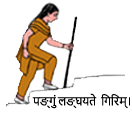Sunlight
Adequate sunlight means exposure of face and hands to the sun between 10 am and 3 pm for at least 30 minutes. The quality of sunlight diminishes in cloudy weather and polluted environment. In addition, whole-body clothing (as in cold season or hilly areas) and dark skin (as in India) impede the effect of sunlight on the manufacture of vitamin D under the skin.
Calcium in Diet
The average Indian diet contains about 300 mg of calcium. Calcium from vegetarian sources is not adequately absorbed due to oxalate and phytate content. Moreover, caffeine, carbonated beverages (which contain phosphates), high salt intake, and a high fiber diet reduce calcium absorption. Laxative abuse and increased intestinal mobility due to emotional instability are other causes of inadequate calcium absorption.
Some food items with high calcium content are as follows:
Milk and milk products, Shrimp, Crab, Fish, Egg yolk, Tofu, Colocasia (Taro), Gingelly seeds, Cumin seeds, Spinach, Agathi, Drumstick leaves, Amaranth, Soya beans, Cabbage, Beans, Ragi, Almonds.
Recommendations for Indian Population
- Recommendations on dietary allowances for calcium (Indian Council for Medical Research and National Institute of Nutrition 2020)
- Also, refer to Food Safety and Standards Authority of India
| Infants (0-12 months) | 500 mg elemental calcium/day |
| Children (1-9 years) | 600 mg elemental calcium/day |
| Children (10-17 years) | 800 mg elemental calcium/day |
| Adults | 1000 mg elemental calcium/day |
| Pregnant women | 1000 mg elemental calcium/day |
| Postmenopausal and lactating women | 1200 mg elemental calcium/day |
Vitamin D 400 ug/day (if exposure to sunlight is inadequate)
Other Bone Diseases
